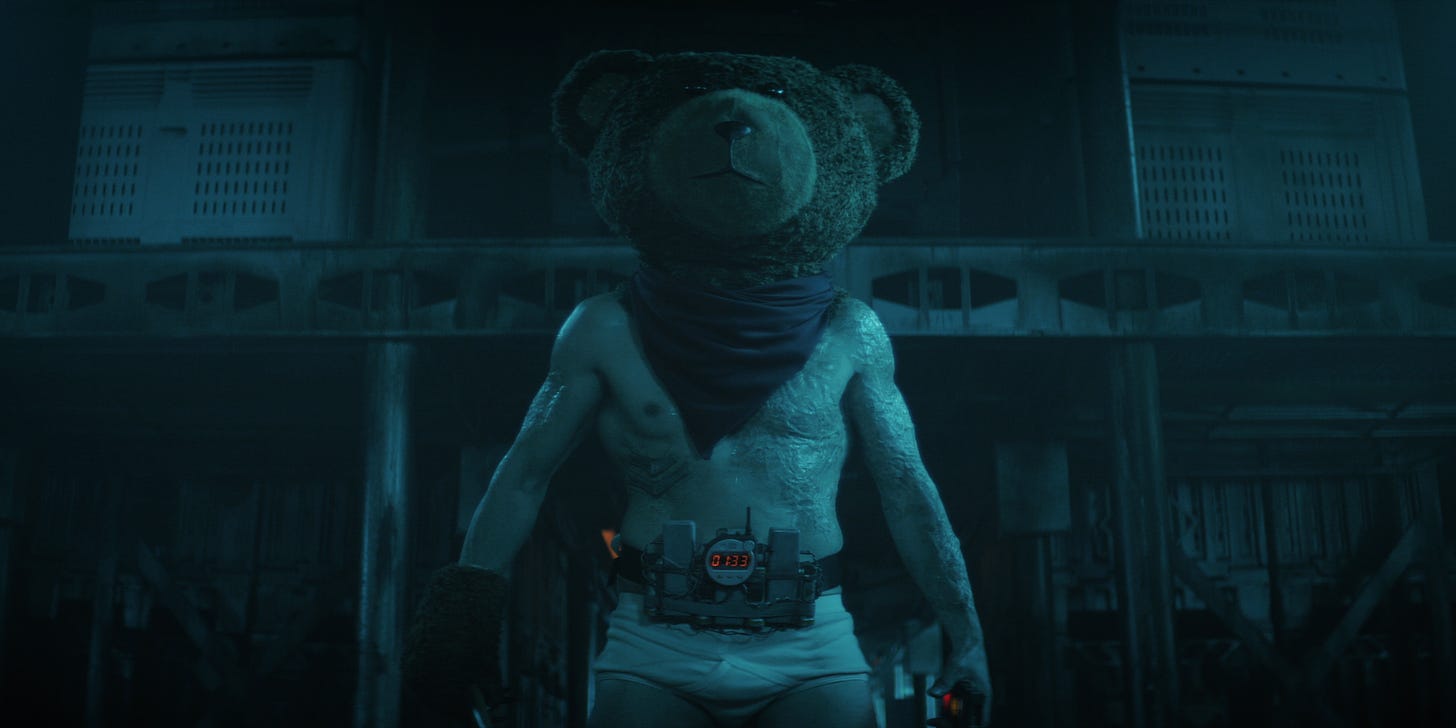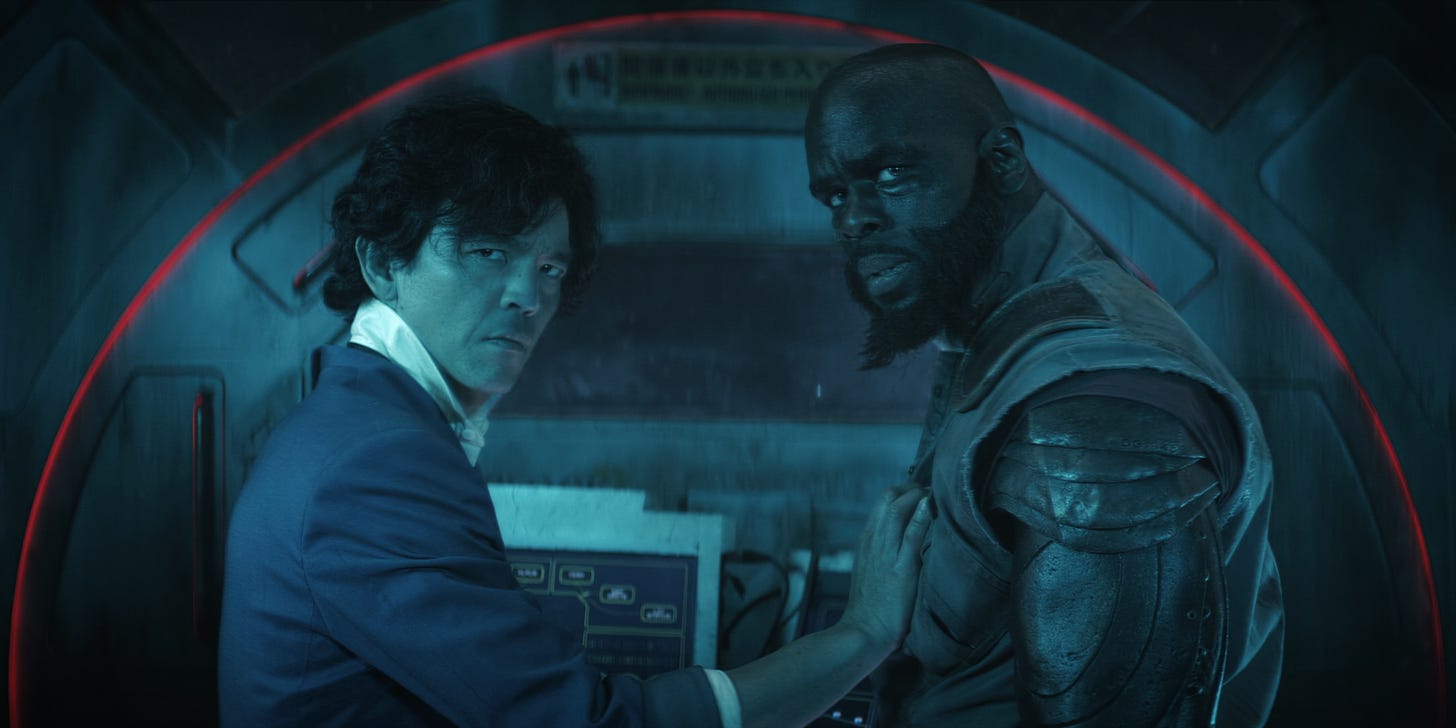Cowboy Bebop brings gaming's appeal to the big screen
Stephanie Bendixsen on getting lost in a story
You’re reading Scene & Heard, a weekly newsletter where I chat to a guest writer about the one scene from a recent Netflix release that left them floored. It’s part of Netflix Pause, a publication that’s all about hitting pause to reflect on the latest film and TV. Subscribe now to get it in your inbox every week diving into screen culture.
I’m Joseph Lew, editor of Netflix Pause and I love a cheeky game. The appeal of a game rests in the escapism they offer. They’re a way for a player to immerse themselves in a different setting, to see themselves as a different character. You can be a farmer in Stardew Valley, a post-apocalyptic survivor in Fallout 4, or a serial baby-maker in The Sims. When it comes to gaming, there are no limits on who you are, or who you can be.
Much like a video game, Cowboy Bebop offers a window into another world. With complex storytelling, gritty futuristic visuals, and a jazzy soundtrack, it’s easy to be sucked into the solar system of the Bebop-verse.
Someone who knows far too well the escapism that gaming offers is author, television host and games critic, Stephanie Bendixsen (also known by her gamer tag Hex). Looking at one scene in Cowboy Bebop’s where bounty hunters Spike and Jet confront one of their targets, Stephanie discusses how the stylisation of the series lends to escapism, and how Cowboy Bebop is reminiscent of one big video game.

JL: Steph, Cowboy Bebop is the definition of escapism. There’s so much you can get lost in – there’s bright neon lighting, spaceships, hyperbolic villains, snazzy outfits, witty banter and almost comedic fighting. And sometimes there’s all these things at once, such as this scene you’ve chosen here…
SB: In this scene, Spike and Jet have been tracking down a terrorist known as the Teddy Bomber. He's been bombing buildings with explosives that he hides in a teddy bear, although it turns out his name is Theodore and Teddy is short for Theodore as well, so it's very neatly wrapped in that way.
I just loved the fact that they've been pursuing this character and the absurdity of him just appearing in the end wearing this giant teddy bear head. He’s trying to be this intimidating figure, but you can’t understand what he’s saying underneath it. The comedy that ensues from that exchange makes for a really great scene and plays into the broader absurdity of the world itself. It's a brutal world – it’s very larger than life – but it's also quite wacky and cool. And that's part of what makes the show feel vibrant and exciting. It's unexpected and visually exciting to look at.
That contrast is something you notice immediately. When I came into this series, I was surprised at how everything is set within this gritty noir backdrop, but yet so hyper exaggerated and over-the-top.
The visual style has also been a big standout for me – it's obvious that it has come from a different source material. When you see something that has been adapted from a comic book or an anime, you can see an homage to that in the framing and the shots that they use.
Watching some of the fights in Cowboy Bebop, I was thinking about how so much of modern action is really fast cuts between the action, but in this show it’s slower and paced. When you look at an anime fight, there are considered, stylised shots to show you every movement that they’re making. And you see that in this scene as well – there are some interesting shots that feel stylistically super deliberate. Even if they don't seem particularly conducive to realism, it doesn't matter, because this is a show that's very much about style first.
Up until this point, all we really know about Spike is that he has something of a mysterious past and a connection to the syndicate. And it's obviously something that he is still kind of withholding from his partner. It’s one of those narrative moments where he’s figuring out how he's going to share this aspect of himself, and whether he’s ready to do it. In a lot of storytelling, whether it be in video games or other kinds of media, you're left with the weight of this choice, and whether this is going to come back to bite you at some point.
I think it’s funny you bring up video games, because I was going to say, Cowboy Bebop reminds me of one. In a game, everything is so carefully considered and works perfectly together – there are so many different elements you can get sucked into, the dialogue, the sounds, the characters, the story. It’s the same that can be said here.
There's a fight scene at the end of the first episode that takes place in an open area with lots of cover, where people are popping up and stuff. It felt just like a cover-shooter to me! Again, I think it’s also in the way that it has been stylistically directed, using camera techniques that wouldn’t typically be used for an action film. Because of that, it feels more video gamey.
Nowadays, we can see how gaming’s inspiring television, and television’s inspiring gaming. We’ve got the Witcher, Arcane, and even Love Island(?!?!) which exist across both mediums. When I was a kid, I played this game called John Deere – it was like a tractor game, but created by an agricultural machinery brand. Now THAT’s cross-platform!
Ha! I just played Farming Simulator 22, so tractor games are still going strong!
But no, I think that’s definitely true. There’s a big push for video games to be readapted to a broader audience and because video games are becoming more cinematic in the way that they're made, they're lending themselves to other mediums more easily.
Before, a lot of video game adaptations were notoriously terrible. That's changed now, with the maturity and the direction that video games are going, and streaming services offering longer form platforms for those stories to be told. There's always the fear of losing out on some aspect of the video game experience, because you don't have that interactivity, so the storytelling needs to be really good and immersive to make up for that.
I think storytelling has always been important to humans. They offer us an opportunity to see the world a little bit differently, to imagine life from a different perspective, to feel inspired by acts of heroism, and moments of compassion or love. I'm sure a lot of the people you've spoken to over this past year have cited the fact that having access to this kind of entertainment when we've all been so isolated has just been really important for everyone's mental health.
Speaking of immersive storytelling, there’s something to be said for the rich alternate universes that games and television offer for us to get lost in.
Escapism is always going to be something that we gravitate towards to decompress from everything that's been cluttering our minds. To be visually transported as well adds another layer to it, allowing us to feel like we've lived in someone else's shoes for a short time.
My parents were pretty anti-video games when I was a kid. I didn't have consoles or anything growing up, but I was nerdy, and I read a lot of fantasy fiction. But I think my parents saw video games as a massive waste of time. They were adamant about them not being in our house, but thankfully, I got to play quite a few video games at other friends and neighbours’ places. I was really fascinated by them, and because I loved fantasy so much, I saw video games as an extension of that passion. As soon as I was old enough to get my own computer, I started playing World of Warcraft.
It's not really a video game per se, but the first game that I ever got involved with was a completely text-based RPG that you played online. The genre is called a MUD (a multi-user dungeon). It came out in the ‘80s and is difficult to explain – it’s like an online Dungeons and Dragons. I got away with playing it at home because it was all text, so my parents didn't catch on to the fact that it was a game.
It was, and remains, one of the most transformative gaming experiences that I've ever had. Nothing will ever match that; it was so unique and so specific in terms of its storytelling. It came into my life at a time when I was pretty awkward at school. I was about 15, 16 when I started playing it, and I was struggling socially. I was going through this massive goth phase. I liked the idea of being this character – no one knew who I was in real life in that world. They just knew me as this powerful warrior elf woman who was confident and beautiful and tall and an incredible fighter. It got me through a time in my life that was difficult. And that was my outlet.
Once I was old enough to start playing games properly – to buy myself a console and build myself a PC – it was all in for me and I ended up pursuing a career in the industry. If you deny your kids something, they'll only turn around and find a way to make their whole life about it.
Who didn’t have a goth phase!
Stephanie Bendixsen (Hex) is an Australian television presenter, speaker, broadcaster, games critic and author. You can follow her on Twitter and Instagram.




